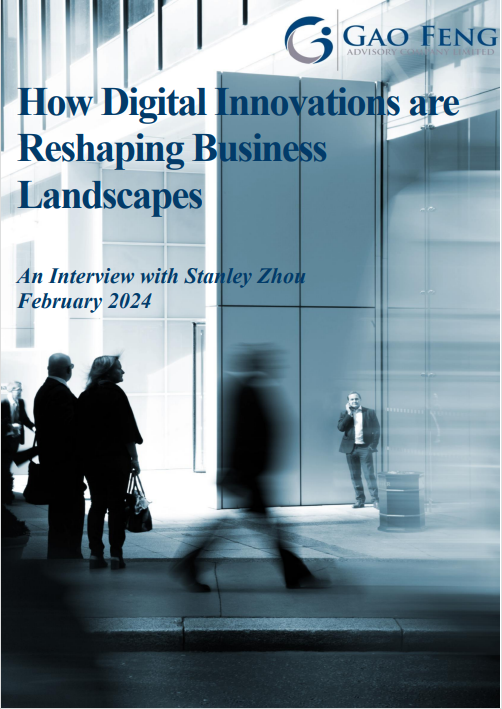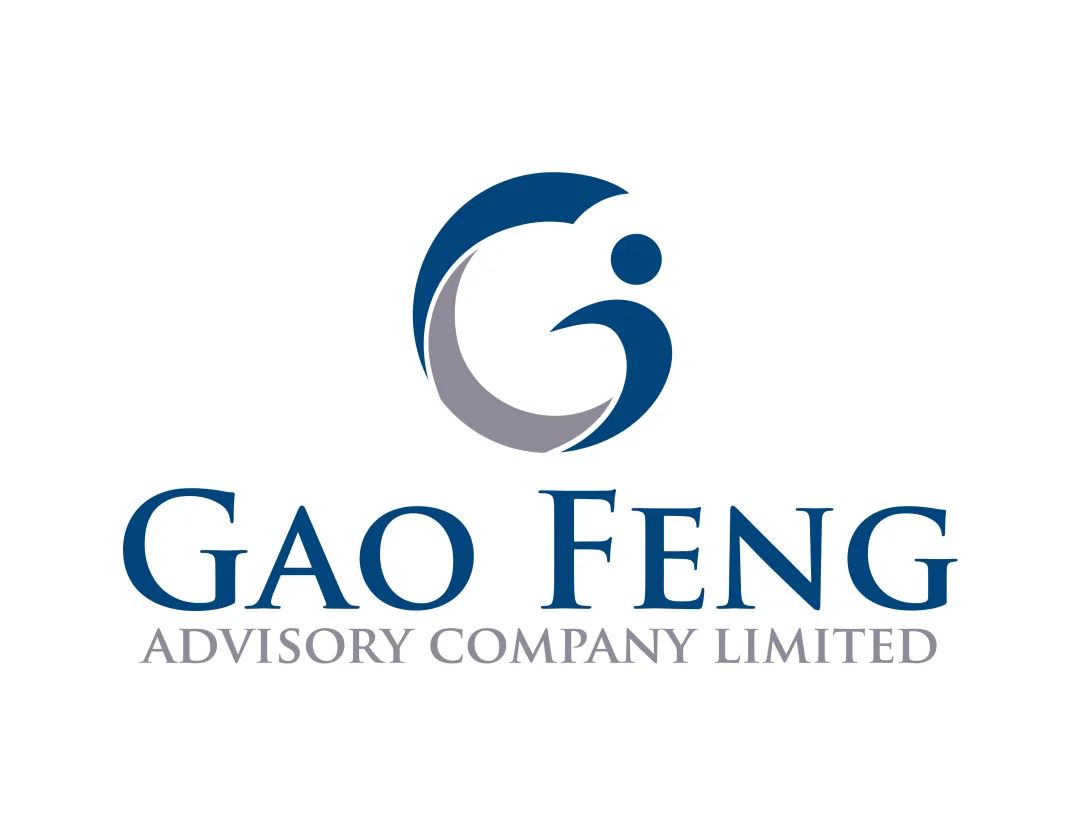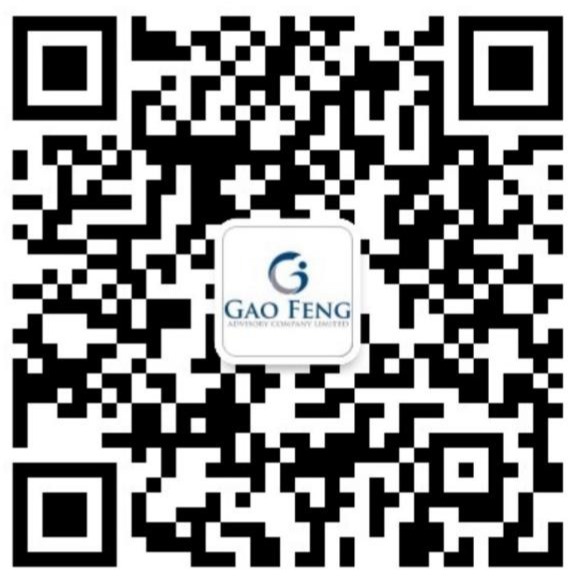How Digital Innovations are Reshaping Business Landscapes

In the rapidly evolving landscape of the digital age, companies that embrace innovation and technological disruption are poised to thrive. ZhongAn Insurance stands as a pioneering example of how a company can leverage technologies to redefine an industry and create value for customers.
This viewpoint offers a glimpse into the innovative spirit and digital-first approach that have propelled ZhongAn's remarkable growth over the past decade. Through an engaging interview with Stanley Zhou, Director of Capital Market and Investor Relations at the company, we uncover the strategic vision, operational mindset, and technological prowess that have made ZhongAn a trailblazer in China’s insurance sector.
As China continues its transformation into an indispensable economic power, the story of ZhongAn serves as a testament to the nation's entrepreneurial spirit and the pivotal role of innovation in driving growth and progress. This article invites readers to embark on a journey through the innovative DNA of ZhongAn Insurance, inspiring businesses worldwide to reimagine their industries and seize the opportunities presented by the digital revolution.
Edward Tse (hereinafter Ed): Hi, Stanley, thank you for your time today. Can you briefly describe your professional career so far?
Stanley Zhou (hereinafter Stanley): I joined ZhongAn Insurance back in January 2018 after ZhongAn got listed in 2017. I was running the Department of Investor Relations.
I started my career in 2011 after graduating from Shanghai International Studies University, where I majored in Arabic. I joined KPMG. I was first in the audit department and was then transferred to transaction services in the advisory department and was doing financial due diligence and transaction advisory. After leaving KPMG, I joined an investment bank to do the IPO work. After that l started in the private equity business in BOCOM International.
I've now been with ZhongAn for more than 6 years. It's one of the longest career journeys in my entire career so far. So, it's been a very pleasant and very fruitful experience for me at ZhongAn. We are still a young company compared to other larger financial institutions. More than half of our employees are engineers. It's a very innovation-oriented company. Our CEO Mr. Jiang Xing was previously the CTO of ZhongAn and before ZhongAn, he was the CTO of Taobao.com (part of Alibaba Group). He has built a top management team at ZhongAn, with a technology background in Chinese financial institutions. Technology is the most important part of our daily work and our long-term visions.
Ed: Could you describe to us briefly about the business and operations of ZhongAn Insurance? Why is that different from others? Why is it innovative?
Stanley: We obtained an online property and casualty license in China. As such, we don't have any offline subsidiaries, offline agents, or offline branches. We entirely distribute the products and provide our services online leveraging our own platforms, like our own app or mini programs as well as collaboration with our ecosystem partners. We have more than 40 ecosystem partners in China, including the leading Internet platforms. The purely online business model has enabled us to see very strong growth in the last 10 years. Our CAGR in sales in the last 10 years has been around 50%; that is much faster than the industry average. Even compared to others in the online insurance sector, we are seeing much faster growth as well. We saw the behavior of Chinese consumers shifting from offline to online in the last 10 years, especially back in 2020, after the COVID outbreak.
In 2020, we saw a very strong surge in our business during the pandemic outbreak. For example, our health insurance revenue in the first half of 2020 has doubled. Apart from the online business model, as mentioned, more than 50% of our employees are engineers and technicians. We can have a very smooth integration with our ecosystem partners. For example, the system at Taobao.com is very agile and includes very frequent data processing. So that requires our system to have a very timely response to their system as well. Our IT-oriented infrastructure and the organization has enabled us to have very smooth integration with the internet platforms. So after 10 years of operations, we have 3 major business segments right now. First is the online P&C license. We operate this business in mainland only. Last year in 2023, our revenue grew to 29 billion RMB. That ranked us as the ninth-largest revenue company in the Chinese P&C market. We have the fastest growth, and are the youngest player in the top 10th. We were quite close to the top 8th already last year. We are quite confident that we can exceed the top 8th this year.

Apart from the online P&C business in mainland, we have the technology export business both in the domestic China market as well for the overseas market. In 2022, the revenue in this business exceeded 600 million RMB already. We both export our technology solutions such as insurance call system solutions to domestic players such as China Pacific Insurance, Taiping Insurance and also to small and medium insurance players, as well as those in other financial sectors in the Chinese market. For the overseas business, we also cover a lot of the leading players, such as the AIA and the Prudential in the Asian market. Last year, we further tapped into the European insurance market. Apart from the insurance sector, we also have some collaboration with Internet platforms such as Grab and OVO (internet platforms in Southeast Asia) to provide our insurance solutions to these internet platforms for exporting technology solutions.
Last but not least, we have a virtual banking license in Hong Kong, which is called ZA Bank. It's also called a digital bank. It means we don't have any offline branches or offline subsidiaries. We purely distribute products online leveraging an app. By the end of last year, we had already served more than 700,000 users, including Hong Kong, as well as mainland Chinese visitors. For ZA Bank, we are trying to build comprehensive and one-stop financial services for our customers because right now, we only provide very basic banking services to our customers in Hong Kong or mainland Chinese visitors. For the long term, we would like to offer more comprehensive services, such as stock trading for Hong Kong.
So those are the major business we are operating right now, which contribute quite meaningful revenue so far. We also have some life insurance business in Hong Kong as well. It is not that large, but it is quite a complement to our ZA bank services.
Ed: What's the total revenue for ZhongAn Insurance as a whole?
Stanley: For the ZhongAn online P&C license, the gross revenue permanent last year was 29.7 billion RMB.
Ed: Based on what you described I could see that ZhongAn was a product of China's technology innovation in the era of rapid technological innovation. Would you say technology innovation plays a major part in your operations and your strategy?
Stanley: We leverage technology to explore the incremental market. In China’s P&C market, it is dominated by auto insurance. It comprises around 60% of the revenue of the entire market. But for us, auto insurance only comprised around 6% of our total revenue. Therefore, we are very focused on innovation to address the underserved demand. Around 75% of our revenue comes from our 2 ecosystems. First is the digital lifestyle. We have a famous product called Shipping Return Policies. Started 10 years ago we began to collaborate with Alibaba’s e-commerce platforms to offer shipping return policy. It solved the pain points regarding the freight expenses of the consumers. When customers are not satisfied with the merchandise they bought online, they can return them.
The average ticket size is low - only around 50 cents in RMB, but we can provide around 6 RMB to 10 RMB coverage covering the logistics cost. Even after its launch around 10 years ago, the shipping return policy achieved around more than 40% growth in our business. We only work with Alibaba’s e-commerce users; we also embrace live-streamed and short video channels like Douyin and Kuaishou. So we are trying to leverage our technology to serve a lot of the underserved channels as well as was for their users and for their platforms.
Another example is for our health insurance. For a long time, the Chinese health insurance market has quite dominated by the critical disease products that are served by life insurers. But their business model relies on offline agents, so their costs of sale are quite high. The average ticket set would be more than 5,000 RMB per year. We launch our medical insurance since 2016. It's called “a million-dollar coverage product”. Right now. It's very popular in the Chinese market. It's very cheap for people around 30-year-old. The average annual premium is only around 300 RMB to 400 RMB. But we can provide a 6 million RMB coverage. So our mission is to try to launch a lot of affordable, achievable, and accessible products to the users who are under-served in the Chinese market by leveraging our tech to achieve more precise pricing and to reach better risk control. As a result, we not only saw a quite strong growth in our business performance in the last 10 years, but we also achieved profitability 3 years ago. We see a constructive and continuous growth in profitability. We need to balance our growth and our profitability. Innovation is always at the core of what we do. We don't want to compete with the “red ocean” market or compete with the leading SOE insurers in China. We need to continuously explore more innovation to fund our growth engines going forward.

Ed: It seems to me that innovation is in the DNA of ZhongAn. Where did it come from?
Stanley: We not only witnessed the trend of the insurance history; we also followed the trend of the Internet ecosystem in the last 10 years. So we embrace the new Internet scenarios. For example, we leverage the WeChat ecosystem to distribute our products.
Half of our employees have IT background. Also, we have a very flat organization. Product managers can report to the CEO if they come up with new ideas. The flat organization has enabled us to be swifter in responding to the market than other competitors do. We also witnessed the emergence of live streaming and short video platforms. Now we have the largest market share in Douyin, because I think behind it is the organization the very innovation-motivated. The organization enables us to evolve our business plan and the product, to cater to evolving launch.
Ed: And what's the next step for ZhongAn?
Stanley: In the next 10 years we will try to embrace more emerging Internet platforms. But I think we want to focus on our own proprietary channels and our proprietary traffic rather than purely relying on third-party channels. That’s our strategy since 3 years ago. We want to monetize and serve our users from our DTC (direct-to-customer) channels. We want to build our own brand because we are seeing better profitability by selling our products in our DTC channel. So I think ZhongAn will put our proprietary channel and the traffic as the top priority, including to build our own live streaming official channels and also to further leverage our ecosystem, such as building our private domain, to monetize our existing customers that we have accumulated in the last 10 years.
Ed: So it seems to me that digital innovation will continue to be a major core of your strategy going forward. If we move beyond ZhongAn Insurance as a company, where do you see the privately-owned companies going in China? How important do you think innovation and entrepreneurship will continue to be for China in the next, say 5 to 10 years?
Stanley: Chinese entrepreneurs will continue to explore innovation in the next 10 years. They will need to balance regulations and social benefits. They will be as aggressive as they did in the last 10 years, but there are still a lot of innovation areas to explore in the next 10 years. They will be more technology-oriented rather than business model innovation-oriented.
Ed: The tentative title of our new book is going to be China: The Indispensable Nation. Did you agree with that point of view that China will continue to be indispensable?
Stanley: I totally agree with this title. Amid some macro challenges or concerns recently. China is exploring a lot of high-tech products. The basic infrastructure is intact. The technology capacity and capability are competitive now.
Ed: I'm interested to hear if you have any views on artificial intelligence. What role might AI play in ZhongAn and, in particular, in the insurance industry in China in general?
Stanley: We introduced AI in our business 10 years ago, we were quite focused on the last generation AI, like natural language processing or OCR (Optical Character Recognition). For example, and we have because we are, we have because a lot of products we distribute are entirely. It's the automation. The rate is very high. For example, we use robots to automate the claim and policy writing procedures. Since last year we also embraced the large language model. We can see the operation efficiency, which is reflecting in our financial statements. And also, the headcount of the staff numbers didn't grow so much because AI is widely adopted within our business operation.

Ed: That's very interesting. I'm interested in knowing a little bit more about your views and the overseas opportunities for ZhongAn. And what do you think you can bring when you go and your business goes more and more international. What do you think your advantages will be?
Stanley: For overseas business, our strategy is to leverage a tax export as the revenue rather than to acquire a license in different regions because for the license business it requires capital and also the most important thing is the regulation in different regions. The cost should be high. But actually, for us, we're doing the technology export business. The business model is capital light. And also, we can export our insurance scoring solutions to clients globally, as it offers a more straightforward and simpler way to expand our business, technology, source models, and know-how to overseas clients. For example, for a lot of the overseas clients, the digitalization is their midterm visions and the strategy. So we are the best partners for their digitalization strategy. Because they recognize our joint brand in the digital insurance in the world. And also, we can export a lot of the proven business models for shipping term policies and health insurance. We see a very successful showcase insurance market. We also export this kind of know-how to our clients overseas. This is our value for them.
Ed: Can you say roughly how much you spend on R&D per year or percentage of your revenue, or anything like that?
Stanley: Average is around 6% of the total revenue every year.
Ed: ZhongAn is a good example of the Chinese entrepreneurial and an innovative company. It’s been growing very fast in the last 10 years and looks like it will continue to grow at a fast rate going forward.
Stanley: Our DNA is innovation and it looks like it will continue to innovate. I think that is a good example on how Chinese companies will continue to be China’s major engine in the future. And I think ZhongAn would be a good example of that.
Ed: How many staff do you have?
Stanley: Right now, from the group of eyes we have 4,000 staff.
Ed: Headquartered in Shanghai?
Stanley: Yeah, headquartered in Shanghai, and we also have some branches across Mainland like Shenzhen and Beijing. And also, we have the headquarter for the ZA Bank in Hong Kong. For the overseas tech business, Singapore is our Southeast Asia headquarter. Also, we're doing pretty well in the Japanese market, because previously we had a joint venture with Softbank’s Vision Fund. So we have quite a good brand in the Japanese market. So right now, we are trying to explore more opportunities from the European market.
Ed: Thank you. Stanley. I appreciate your time.
Stanley: Thank you. Keep in touch.



Gao Feng Advisory
Gao Feng Advisory Company is a professional strategy and management consulting as well as investment advisory firm with roots in China coupled with global vision, capabilities, and a broad resources network
Wechat Official Account:Gaofengadv
Shanghai Office
Tel: +86 021-63339611
Fax: +86 021-63267808
Hong Kong Office
Tel: +852 39598856
Fax: +852 25883499
Beijing Office
Tel: +86 010-84418422
Fax: +86 010-84418423
E-Mail: info@gaofengadv.com
Website: www.gaofengadv.com
Weibo: 高风咨询公司
